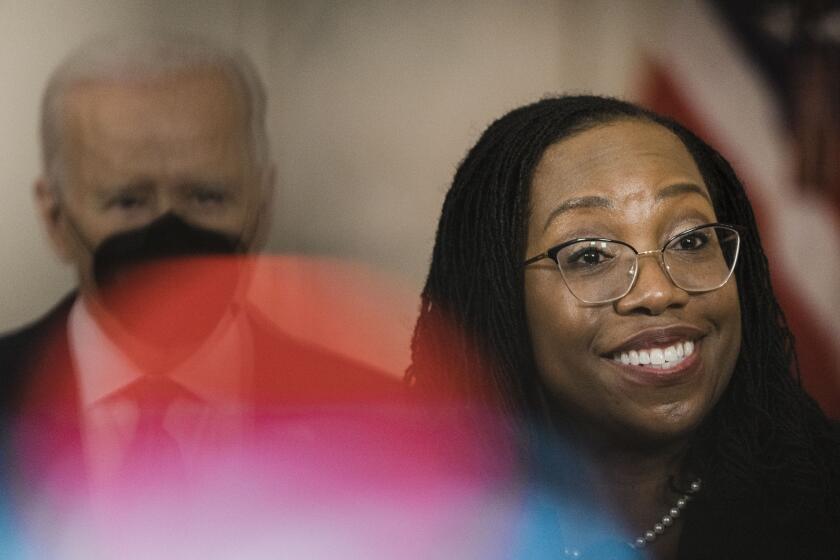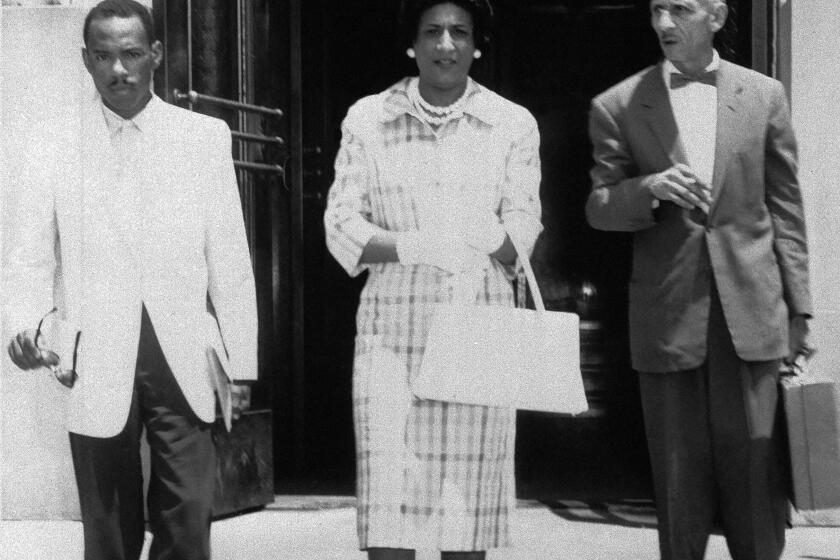Ketanji Brown Jackson’s critics won’t be the ones making history

- Share via
Ketanji Brown Jackson had me at “Whoa!”
The Senate hearing this week on Jackson’s nomination to be the first Black woman on the Supreme Court had several uplifting moments that captured just how momentous her ascension would be in the story of America’s imperfect striving to live up to its ideals. Let’s not let those moments be overshadowed by Republicans’ false, racially shaded smears — that she has “a record of activism and advocacy” for sexual predators, that she’s “zealous” on behalf of terrorists, and that she “twisted the law” for a drug kingpin.
A particularly moving scene came late Wednesday in Jackson’s exchange with a Democratic senator, Alex Padilla, as the Senate Judiciary Committee ended nearly 24 hours of questioning over two days.
Ketanji Brown Jackson is an unequivocally well-qualified nominee for the Supreme Court. But if she is confirmed, the court’s conservative hammerlock will not change.
Padilla, the first Latino senator from California and just the 11th in U.S. history among more than 1,300 senators, recalled the time a teacher discouraged him from applying to MIT. Padilla (class of ’94, by the way) told Jackson, “I know that you, too, have been doubted on your way to the seat that you find yourself in today.” He wondered: What would she tell young people like their past selves?
Jackson, visibly moved by Padilla’s story, told her own, of a lonely walk one evening her freshman year through Harvard Yard, the school’s historic center. Spurred by her high school debate coach in Miami, she’d applied. “But I get there,” she recalled, “and whoa!”
Not only the weather was a change from what she’d known, but also the kids and the socioeconomic status many reflected. Depressed, she mused as she walked.
Her credentials and qualifications to join the Supreme Court are beyond dispute. Yet the GOP is attacking Jackson, a Black woman, because she is a Biden nominee.
“It was rough. It was different than anything I’d known. There were lots of students who were prep school kids — like my husband,” she said, drawing chuckles directed at her spouse, surgeon Patrick Jackson, sitting behind her. “I was really questioning: Do I belong here? Can I — can I make it in this environment?”
At that, I teared up. I was transported to my own first hard months and “whoa” moments at an elite university. As a lower-middle-class daughter of a widowed mom, I also learned then about things like prep schools, which seemed to have funneled every other wealthier, more sophisticated and seemingly more confident classmate to our campus.
I’ve often thought since, how much worse is the loneliness and self-doubt for students of color?
If confirmed, she’d be the first justice in the Supreme Court’s modern history to have served as a federal public defender.
I gave in to the pressures and went home, to a public university. (I’d return to the elite school, older and more confident, for a graduate degree.) Fortunately for Jackson, and the country, she did not cave — thanks partly to what happened next in Harvard Yard.
“A Black woman I did not know was passing me on the sidewalk,” Jackson said. “And she looked at me, and I guess she knew how I was feeling. And she leaned over as we crossed and said, ‘Persevere.’”
That, Jackson told Padilla, is what she tells young people now.
Jackson sure persevered. She graduated from Harvard and its law school; clerked for federal district and appeals court judges and Supreme Court Justice Stephen G. Breyer, whom she’ll replace if the Senate confirms her; practiced law at a private firm and as a public defender; became a district judge; and last June was confirmed by the Senate as a judge on the D.C. Circuit Court of Appeals.
Constance Baker Motley had a better resume than Sandra Day O’Connor. But when it comes to ‘qualified,’ only the opinions of the president and Senate count.
Most Republicans, but especially Sen. Lindsey Graham, the Trumpian lapdog from South Carolina, and presidential wannabes Ted Cruz of Texas, Josh Hawley of Missouri, Tom Cotton of Arkansas and Marsha Blackburn of Tennessee, all but ignored Jackson’s obvious qualifications and distorted her record to make her out to be soft on crime, child porn and terrorists.
While Jackson earned a unanimous rating of “well qualified” from the American Bar Assn., Blackburn told Jackson she’d used her talents “not to serve your nation’s veterans or other vulnerable groups, but to provide free legal services to help terrorists get out of Gitmo and go back to the fight.”
Sending terrorists back to the fight? That’s beyond outrageous. Jackson not only nobly represented four detainees at the Guantanamo Bay detention center as a public defender, in keeping with the Constitution’s promise. She also did so at the same time her brother was serving in Iraq as an Army infantryman.
Sen. Ben Sasse of Nebraska, who was a model of civil questioning of Jackson, called out his fellow Republicans’ behavior. Just after Cruz had grilled Jackson about the right-wing bugaboo of critical race theory, Sasse told her, “I think we should recognize that the jackass-ery we often see around here is partly because of people mugging for short-term camera opportunities.” Even as Sasse spoke, a photographer for the Los Angeles Times caught Cruz checking Twitter for mentions of his name.
Padilla called Jackson’s hearing “a new Exhibit A” showing that people of color “often have to work twice as hard to get half the respect.” By then, Graham had complained repeatedly that when a Black or Latino nominee is a conservative, Democrats try to block them. Yet the two Black nominees Graham cited, Justice Clarence Thomas and former Judge Janice Rogers Brown, both were confirmed — despite legitimate questions about their ideology and character. (Brown, for example, had characterized New Deal programs including Social Security as part of a socialist revolution, and Thomas had to rebut allegations of sexual harassment.)
Despite Republicans’ negativity all week, Jackson is expected to win confirmation next month. Padilla chose to remain positive about her history-making candidacy. Echoing New Jersey Sen. Cory Booker, a Democrat and just the 11th Black senator ever, Padilla told her: “I, too, refuse to let anyone steal my joy.”
That makes three of us. I know there are countless more.
More to Read
A cure for the common opinion
Get thought-provoking perspectives with our weekly newsletter.
You may occasionally receive promotional content from the Los Angeles Times.














